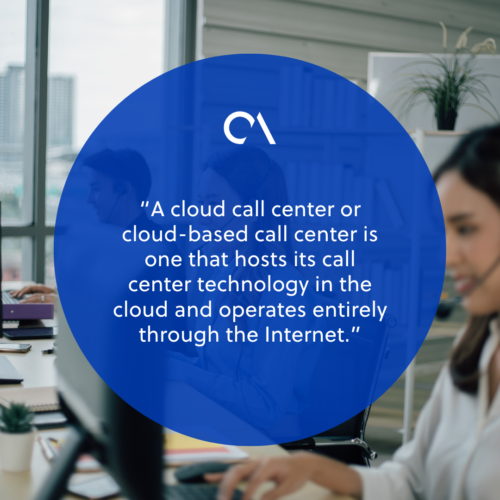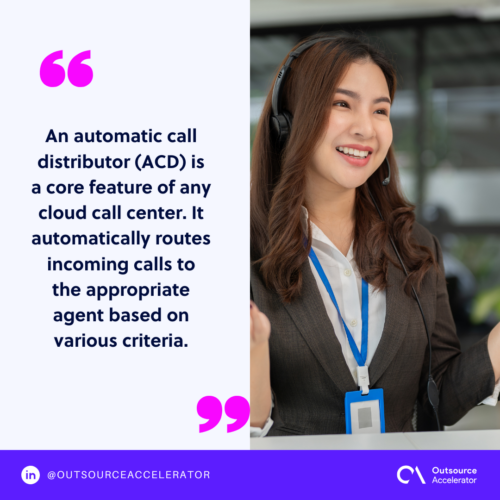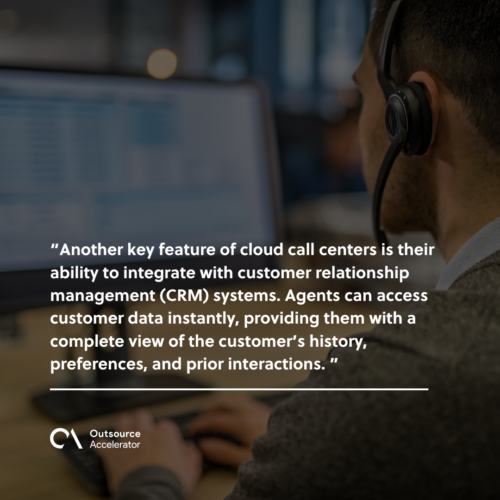Is your business ready for a cloud call center?

Call center operations are the backbone of customer service, but managing them can be a constant struggle. From long hold times and high employee turnover to poor call routing and technical glitches, the challenges are real and often overwhelming.
For instance, imagine a customer waiting for hours on end only to be disconnected. Both the customer and agent were left frustrated. Or a call center dealing with the pressure of an unexpected spike in call volume during peak seasons, making it impossible to provide timely service.
These scenarios are far from isolated and happen in many daily operations, affecting customer satisfaction and overall efficiency. But it’s a good thing there are ways to combat these challenges.
In this blog, we’ll explore a cloud call center, a solution that could transform your customer service experience.
We’ll break down how this modern technology can help businesses streamline operations, increase efficiency, and create a smoother experience for both agents and customers.
What is a cloud call center?
A cloud call center or cloud-based call center is one that hosts its call center technology in the cloud and operates entirely through the Internet. It is managed and supported by a third-party vendor.
Instead of relying on traditional, on-site infrastructure, cloud-based systems use software hosted online.
A cloud call center typically includes core technologies like the automatic call distributor (ACD) interactive voice response (IVR) system.
Beyond these essentials, a cloud call center can also integrate additional modules, such as workforce management tools to optimize staffing and advanced analytics to track performance.
This setup allows businesses to scale operations and improve customer service with flexibility and lower upfront costs.

Cloud call center vs. On-premise call center
There are several key differences between cloud call centers and on-premise call centers.
As mentioned before, cloud call centers rely on online operation, with their technology and data stored by an outside provider. Agents that have access to the internet can work from any location.
Cloud call centers get rid of the need for costly equipment at your office and make it simpler to expand as your business gets bigger.
On the other hand, an on-premise call center requires physical infrastructure and equipment, typically housed in a specific location. This setup can offer more control over systems and data but comes with higher costs for maintenance, upgrades, and staffing.
Scaling an on-premise center often requires significant investment in new hardware and software.
How a cloud call center works
Here’s a breakdown of how a cloud call center usually works:
- Routing calls. The system uses an automatic call distributor (ACD) to route incoming calls to the most appropriate agent based on pre-set criteria like availability or expertise.Interactive voice response (IVR). IVR systems automate basic customer inquiries, directing callers to self-service options or routing them to agents when needed.
- Agent access. Agents can log in from any location with an internet connection, using cloud-based software to manage calls, chat, or emails.
- Analytics. Real-time reporting and performance tracking are available, providing insights into metrics like call volume, agent performance, and customer satisfaction.
- Versatility. As demand grows, businesses can easily scale their operations without needing major infrastructure upgrades.
Key features of a cloud call center
A cloud call center is an attractive solution for companies aiming to enhance customer experiences and optimize operations.
Below, we’ll explore the key features that set cloud-based call centers apart:
1. Automatic call distributor (ACD)
An automatic call distributor (ACD) is a core feature of any cloud call center. It automatically routes incoming calls to the appropriate agent based on various criteria, such as:
- Skills
- Availability
- Priority
This ensures that customers are connected to the right person without long wait times. ACD systems can also handle call queues, so businesses can manage high volumes of calls efficiently.
It simplifies the process, reduces customer frustration, and improves the overall flow of customer service.

2. Interactive voice response (IVR)
IVR systems are essential in automating customer interactions. Using voice prompts or touch-tone inputs, customers can access a range of self-service options like:
- Checking account balances
- Updating personal information
- Troubleshooting basic issues
When necessary, the IVR system routes the customer to the appropriate agent.
IVR helps reduce call volumes for routine inquiries, allowing agents to focus on more complex issues. This feature also leads to faster response times, creating a more efficient and positive customer experience.
3. Cloud-based accessibility
Cloud call centers allow agents to work from virtually anywhere. As long as they have an internet connection, they can access the call center system and manage calls, chats, or emails.
Companies are able to hire remote agents, which can significantly expand the talent pool without worrying about office space or hardware limitations.
This accessibility is especially useful for firms with multiple locations or global teams.
4. Scalability
Cloud call centers are inherently scalable, meaning businesses can easily adjust the number of agents or services they offer as demand changes.
Whether it’s hiring more agents during peak times or expanding customer support channels, cloud-based systems make it easy to add new features or adjust resources.
Scalability lets businesses be agile and adapt to evolving customer needs or seasonal fluctuations.
5. Advanced reporting and analytics
This type of call center comes equipped with advanced reporting and analytics tools that provide valuable insights into performance metrics. Managers can track key data points, specifically:
- Call volume
- Response times
- Agent productivity
- Customer satisfaction scores
These insights help firms optimize their operations and make data-driven decisions.
For example, identifying trends in call volume might prompt adjustments in staffing levels, while analyzing customer satisfaction data can highlight areas for improvement in service delivery.
6. Multi-channel support
Customers nowadays expect to interact with businesses through various channels, not just over the phone. Cloud call centers typically offer multi-channel support, enabling agents to handle calls, emails, live chats, and social media interactions from one unified platform.
This feature allows companies to meet customers wherever they are and provide a seamless experience across different communication methods.
It also simplifies operations by consolidating all customer interactions in a single system, improving agent productivity and reducing response times.
7. Workforce management tools
Effective workforce management is critical in any call center, and cloud-based solutions often include integrated tools for:
- Scheduling
- Forecasting
- Performance tracking
These tools allow managers to predict call volumes, optimize agent schedules, and monitor real-time performance.
Workforce management tools help maintain a balance between staffing levels and demand, preventing both understaffing and overstaffing.
8. Integration with CRM systems
Another key feature of cloud call centers is their ability to integrate with customer relationship management (CRM) systems. Agents can access customer data instantly, providing them with a complete view of the customer’s history, preferences, and prior interactions.
A CRM system enables agents to deliver personalized service, resolve issues faster, and enhance the overall customer experience. It also helps firms track and manage customer relationships across various touchpoints.

9. Security
Security is a top priority in any call center, especially when sensitive customer data is involved. Cloud call centers typically offer robust security features, including:
- Encryption
- Secure data storage
- Adherence to industry norms (like GDPR or HIPAA)
These measures protect both the business and its customers from data breaches or unauthorized access.
A cloud-based system is a secure option for handling customer information.
10. Cost efficiency
Lastly, cloud call centers can be more cost-effective than on-premise solutions since they don’t require large upfront investments in hardware or office infrastructure. Businesses can reduce costs associated with physical maintenance and system upgrades.
Most cloud providers offer a pay-as-you-go model, which means companies only pay for the resources they actually use, making it an affordable option for businesses of all sizes.
Choosing the right cloud call center vendor
With various vendors offering different features, pricing models, and capabilities, it’s important to carefully evaluate your options. Here are a few tips to guide your decision:
Assess your business needs
Before diving into vendor options, take the time to understand what your business specifically requires. Consider these factors:
- Number of agents you have
- Channels you need to support (e.g., voice, chat, and email)
- Special features (e.g., CRM integrations or advanced reporting tools)
Focus your search on suppliers who can meet your unique requirements.
Evaluate scalability
Your cloud call center should grow with your business. Look for a vendor that offers easy scalability. This means you can add or remove agents, features, or even entire departments without major disruptions.
A flexible pricing structure that accommodates your growth is also important.
Consider user-friendliness
The cloud call center system should be easy to use for both agents and managers. A complicated interface can lead to confusion and slow adoption.
Before committing, ask for a demo or trial period to test the platform’s ease of use.
Check for integration capabilities
Your cloud call center needs to work well with the other systems you’re already using, like your CRM or workforce management software.
Ask potential vendors about their integration capabilities to make sure everything works together seamlessly.
Prioritize security and compliance
Security is non-negotiable. Make sure the vendor you choose offers stringent security features, including encryption, secure data storage, and compliance with industry regulations, like GDPR or HIPAA.
When working with sensitive client data, this is particularly crucial.
Look at customer support
Good customer support is critical for any service. Choose a vendor that offers reliable, responsive support in case you run into technical issues.
Check reviews and ask for testimonials from other clients to get a sense of how responsive their team is.
Choose a vendor that supports your business goals, improves customer experiences, and provides long-term value.
Now, you’re ready to transition into a cloud call center!







 Independent
Independent




